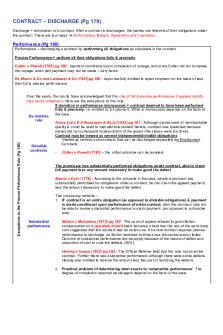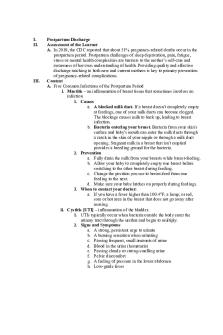Discharge of Contracts PDF

| Title | Discharge of Contracts |
|---|---|
| Course | Business Law |
| Institution | Gonzaga University |
| Pages | 5 |
| File Size | 88.3 KB |
| File Type | |
| Total Downloads | 103 |
| Total Views | 152 |
Summary
More discharge...
Description
18-2a NORMAL DISCHARGE OF CONTRACTS: A contract is usually discharged by the performance of the terms of the agreement. In most cases, the parties performance and the contract ceases to exist or is thereby discharged. A contract is also discharged by the expiration of the time period specified in the contract. 18-2b Nature of Performance: Performance may be the doing of an act or the making of payment. TENDER: An offer to perform is known as a tender. If performance of the contract requires the doing of an act, the refusal of a tender discharges the party offering to perform and is a basis for that party to bring a lawsuit. A valid tender of payment consists of an unconditional offer of the exact amount due on the date when due. A tender of payment is not just an expression of willingness to pay; it must be an actual offer to perform by making payment of the amount owed. PAYMENT: When the contract requires payment, performance consists of the payment of money. Application of Payments: If a debtor owes more money tha one debt to the creditor, and pays money, a question may arise as to which debt has been paid. If the debtor specifies the debt to which the payment is to be applied and the creditor accepts the money, the creditor is bound to apply the money as specified. Thus, if the debtor specifies that a payment is to be made for a current purchase, the creditor may not apply the payment to an older balance. Payment by Check: Payment by commercial paper, such as check is ordinarily a conditional payment. A check merely suspends the debt until the check is presented for payment. If payment is then made, the debt is discharged; if not paid, the suspension terminates and suit may be brought on either the debt or the check. Frequently, payment must be made by a specified date. It is generally held that the payment is made on time if it is mailed on or before the final date for payment. 18-2c time of performance: When the date or period of time for performance is specified in the contract, performance should be made on that date or within that time period. No Time Specified: When the time for performance is not specified in the contract, an obligation to perform within a reasonable time is implied. The fact that not time is specified neither impairs the contract of the ground that it is indefinite nor allows an endless time to which perform.
What constitutes a reasonable time is determined by the nature of the subject matter of the contract and the facts and circumstances surrounding the making of the contract. WHEN TIME IS ESSENTIAL: If performance of the contract on or within the exact time specified is vital, it is said that “time is of the essence”. Time is of the essence when the contract relates to property that is perishable or that is fluctuating rapidly in value. When a contract fixes by unambiguous language a time for performance and where there is no evidence showing that the parties did not intend should be of the essence, failure to perform within the specified time is a breach of contract entitling the innocent party to damages. EX: Dixon and Gandhi agreed that Ghadi would close purchase of a motel as follows “ Closing Date. The closing shall be held… on the date which is written twenty (20) days after that closing of Nomura Financing”. Gandhi did not set close the time period specified and Dixon was allowed to retain $100,000 in prepaid closing costs and fees as liquidated damages for Gandhi’s breach of contract. WHEN TIME IS NOT ESSENTIAL: Unless a contract so provides, time is ordinarily not of the essence and performance within a reasonable time is sufficient. In the case of the sale of property, time is not regarded as of the essence when there had not been any appreciable change in the market value or condition of the property and when the person who delayed does not appear to have done so for the purpose of speculating on a change in market price. WAIVER OF ESSENCE OF TIME LOCATION: A provision that time is of the essence may be waived. It is waived when the specified time has expired but the party who could complain requests the delaying party to take steps but the party who could complain requests the delaying party to take steps necessary to perform the contract. 18-2d Adequacy of Performance: When a party renders exactly the performance called for by the contract, no question arises as to whether the contract has been performed. In other cases, there may not have been a perfect performance, or a question arise as to whether the performance satisfies the standard set by the contract. SUBSTANTIAL PERFORMANCE: Perfect performance of a contact is not always possible when dealing with construction projects.
A party who in good faith has provided substantial performance of the contract may sue to recover the payment specified in the contract. However, because the performance was not perfect, the performing party is subject to a counterclaim for the damages caused the other party. When a building contractor has substantially performed the contract to construct a building, the contractor is responsible for the cost of repairing or correcting the defects as an offset from the contract price. The measure of damages under these circumstances is known as “cost of completion” damages. If however, the cost of completion would be unreasonably disproportionate to the importance of the defect, the measure of damages is the diminution in value of building due to the defective performance. Whether there is substantial performance is a question of degree to be determined by all of the facts, including the particular type of structure involved, its intended purpose and the nature and relative expense of repairs. EX: A certain building contractor (BC) and a certain owner (O) made a contact a construct a home overlooking Vineyard Sound on Martha’s Vineyard according to plans and specifications that clearly called for the use of General Plumbing Blue Star piping. The contract price was 1.1 million dollars. Upon inspecting the work before making republic piping throughout the house. O explained to BC that his family money by investing in General Plumbing, and he therefore would not make the final payment until the breach of contract was remedied. BC explained that Republic pipes were of the same industrial grade and quality as the Blue Star pipes. Moreover, BC estimated that it would const nearly 300k to replace all of the pipes because destruction of walls and fixtures necessary to accomplish such a task. BC may sue O for 400k for breach of contract, claiming he had substantially performed the contract, and O may counterclaim for 3000k seeking an offset for the cost of remedying the breach. The court will find in favor of the contractor and will not allow the 300k offset but will allow a “nominal” offset of perhaps 100 dollars to 1000 dollars for the amount by which the Republic pipes diminished the value of the building. To have required the pipes to be replaced would amount to economic waste. When a contract does not substantially perform its obligations under a contract, not only will the contact not prevail in a breach of contract claim against a homeowner for extra work beyond the contract price but the contractor is liable for the reasonable cost of making the contractor’s work conform to the contract.
EX: Superior Wall and Paver, LLc sued homeowners Pamela and Mark Gacek for $14,350 it claimed was stilled owed Superior as extra work, for concrete pavers it installed in the driveway of their residence. The Gaceks counterclaimed for $60,500 for the reasonable cost of making the contractor’s work conform to the contract. The evidence established that Superior did not install a proper base of 3’’ to 4’’ of crushed limestone before installing the pavers as required by the contract, which caused the pavers to move ,reading gaps between the pavers and causing water to flow into the garage. To correct the problem the pavers needed to be removed and the area and the are excavated and replaced with a crushed limestone base before again installing the pavers. Superior claimed it had substantially performed the contract as a fully stable driveway, and the proper remedy, if any, was the diminution of the market value of the Gacek’s property due to any defective performance. Superior asserted the cost of redoing substantially performed the contract and awarded the homeowners the cost of making Superior’s work conform to the contract by having the job redone, rejecting Superior’s assertion of economic waste. Substantial performance- equitable rule that if a good faith attempt to perform does not precisely meet the terms of the agreement, the agreement will still be considered complete if the essential purpose of the contract is accomplished. CAUSE OF CONTRACT DISCHARGE: Discharge of contract: 1. Conditions a. Precedent b. Subsequent c. concurrent 2. Performance 3. Unilateral action a. Consumer protection rescission. 4. Agreement a. Substitution b. Accord and satisfaction 5. impossibility a. Change of law b. Death or disability in personal service contract c. Act of other party 6. Economic disappointment
a. Commercial impracticability b. Frustration of purpose 7. Operation of law a. Bankruptcy b. Statute of limitations c. Contractual limitations...
Similar Free PDFs

Discharge of Contracts
- 5 Pages

Discharge of Contract
- 8 Pages

Discharge of contract summary
- 8 Pages

Law - 11 Discharge of contract
- 7 Pages

Contract- discharge of a contract
- 12 Pages

Valuation OF Forward Contracts
- 2 Pages

Invalidity of contracts
- 4 Pages

Classification-of-contracts
- 3 Pages

Discharge by Agreement
- 9 Pages
Popular Institutions
- Tinajero National High School - Annex
- Politeknik Caltex Riau
- Yokohama City University
- SGT University
- University of Al-Qadisiyah
- Divine Word College of Vigan
- Techniek College Rotterdam
- Universidade de Santiago
- Universiti Teknologi MARA Cawangan Johor Kampus Pasir Gudang
- Poltekkes Kemenkes Yogyakarta
- Baguio City National High School
- Colegio san marcos
- preparatoria uno
- Centro de Bachillerato Tecnológico Industrial y de Servicios No. 107
- Dalian Maritime University
- Quang Trung Secondary School
- Colegio Tecnológico en Informática
- Corporación Regional de Educación Superior
- Grupo CEDVA
- Dar Al Uloom University
- Centro de Estudios Preuniversitarios de la Universidad Nacional de Ingeniería
- 上智大学
- Aakash International School, Nuna Majara
- San Felipe Neri Catholic School
- Kang Chiao International School - New Taipei City
- Misamis Occidental National High School
- Institución Educativa Escuela Normal Juan Ladrilleros
- Kolehiyo ng Pantukan
- Batanes State College
- Instituto Continental
- Sekolah Menengah Kejuruan Kesehatan Kaltara (Tarakan)
- Colegio de La Inmaculada Concepcion - Cebu






